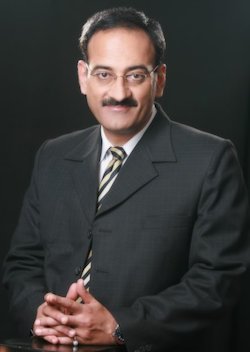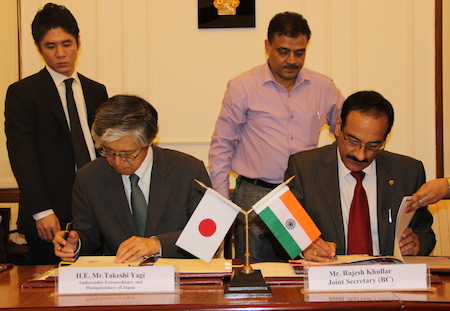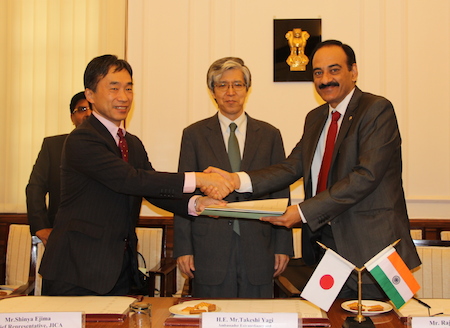 Rajesh Kumar Khullar, India
Rajesh Kumar Khullar, India
Joint Secretary to the Government of India
Ministry of Finance, Department of Economic Affairs
Young Leaders Program (’03)
Shri Rajesh Kumar Khullar has over 23 years of rich experience in the Indian Administrative Service. He currently serves as Joint Secretary to the Government of India in the Department of Economic Affairs, Ministry of Finance where, among others, he has been closely involved with PPPs and infrastructure issues at the national level. Mr. Khullar has served on various positions in the Government such as Director, Public Relations Department, Haryana, Managing Director, Haryana Tourism Corporation, Commissioner of Municipal Corporation, Faridabad, and subsequently, the city of Gurgaon. While he was posted as Commissioner, Municipal Corporation, Faridabad from July 2007 to June 2009, he was conferred an Award of Excellence under Jawahar Lal-Nehru Urban Renewal Mission by the Government of India for improving the city’s green transport mode and sustainable urban mobility. Mr. Khullar obtained his master’s degree in physics in 1984 from Punjab University and a Master of Public Administration from GRIPS in 2003.
Please tell us about your career path so far. What is your area of specialization and how did you come to work in this area?
After I came back from GRIPS to India, I served as Director to the Government of Haryana first in the School Education Department and then in the Agriculture Department. Since 2007, I have been working in the National Capital Region. Till 2009, I ran the city of Faridabad on the south-east of Delhi and from 2009 to 2011 the city of Gurgaon on the south-west of Delhi as Commissioner of their respective Municipal Corporations. Since 2011, I have been working as Joint Secretary to the Government of India in the Department of Economic Affairs, Ministry of Finance. I would say that I have come to specialise in urban infrastructure sector.
You are currently Joint Secretary at the Ministry of Finance. What are your main responsibilities and duties?

Ambassador of Japan, H.E. Mr. Takeshi Yagi, and Shri Rajesh Khullar during a loan signing agreement on 12th November, 2013 in New Delhi.
For the first 19 months, I looked after various infrastructure sectors and investments. Presently, I am looking after bilateral cooperation in the Department of Economic Affairs. This job essentially has 4 elements.
First, I am responsible for economic and financial policy coordination between India and other major countries, including Japan. Secondly, I am responsible for planning the bilateral Official Development Assistance (ODA) coming into the country. Our major bilateral donors are Japan, Germany, France, UK, US and Canada. Thirdly, I am responsible for the concessional loans given by the Government of India to other developing countries, especially in Africa, Asia and Latin America. Finally, I am also responsible for all the overseas training programmes for all Central and State Government officials.
In your current capacity, what do you see as the main opportunities and challenges for India over the course of the next five to ten years?
The main opportunity for India in coming years lies in what we call demographic dividend. If we can equip our youth, which now comprises over 50% of our population, with world class education and skills, we shall certainly overcome the big challenge of continuing with 7% plus growth rate, which trend we have slipped from for some time now. The Ministry of Finance is committed to provide the enabling conditions of sustainable 7% growth rate over the next decade.
What are some of the biggest challenges you face in your work? And what have been the most interesting or rewarding aspects of your career thus far?
In a way, the answer is, “None”. IAS offers enough resources to overcome any challenge that may come up at work. Therefore, truly the only real challenge is the limit of my own abilities. Talking of rewarding aspects, my whole career is full of it. There is nothing sweeter than the joy of wiping tears off of the eyes of people when one is posted in the field assignment. During the policy level assignments at the Capital, it is joy to be able to contribute to the economic and social growth of the world’s largest democracy.
During your career in the Indian Administrative Service, what achievement(s) are you most proud of?

Shri Khullar is shaking hands with JICA Chief, Mr. Shinya Ejima while exchanging the signed loan agreement under the watching eye of Ambassador Yagi.
I was able to get at least 3 different new schemes launched by my State Government. Two of these are now national schemes. During my term as Director, Agriculture, for the first time in the agriculture history of modern India, the State of Haryana became the first State of India in terms of productivity of wheat, breaking the historical leadership of the State of Punjab in this regard. It is a good feeling to know that the State of Haryana has since maintained this position for the last 5 years.
What led you to GRIPS? What is the most important thing you got out of your studies here, and how has your experience at GRIPS prepared you for future endeavours?
I firmly believed that Japan represents the best of the East and the West. That was the prime reason that for my long term training I chose GRIPS over other institutions abroad. The knowledge of international political relations and economics that I gained during the year that I spent at GRIPS has stood me, and is still doing so, in good stead.
What is your fondest memory of your time spent at GRIPS? And what do you miss about Japan?
Don’t ask me that! I have so many wonderful memories which I continue to cherish that I can’t pick one out of them. We had a wonderful time both at the GRIPS and the Tokyo Academic Park in Odaiba. In fact, my children who used to go to Hibari Kinder Garden, also still miss their days in Japan. I have travelled all over the world both before and after my time at GRIPS. I have no hesitation in saying that I continue to be steadfast in my belief that Japan represents the best of both the East and the West.
How do you maintain a balance between your work and the rest of your life?
I wish I knew better than anyone else!
If you could give one piece of advice to anyone considering studying at GRIPS what would it be?
If you are married, go there with your family.
How would you like to maintain involved with the School? What do you expect from GRIPS as an alumnus?
Going by the classical Indian tradition, it is not given to a pupil to ask for anything from his Alma Mater. Instead, the big question is what can I do for GRIPS? Trust me you never find me flinching.
Do you have any suggestions on how to further utilize the GRIPS alumni network?
None. I am sure as long as Karin is in charge, GRIPS will never be short of ideas in this regard.





